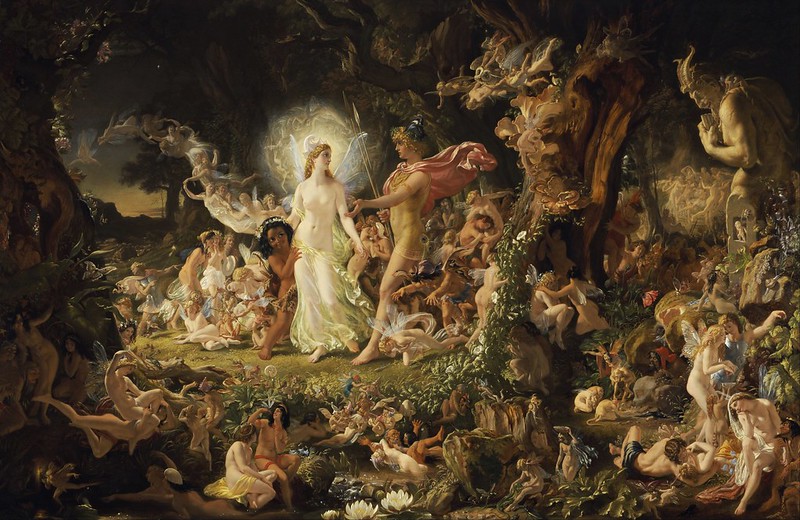Obra de Joseph Noel Paton (1821-1901), pintor escocès (1)
- Recordatori de Ferdinand Büchner -
En el dia de la celebració del seu 193è aniversari de naixement
Parlem de Pintura...
Joseph Noel Paton (Wooer's Alley, 13 desembre 1821 - Edinburgh, 26 de desembre de 1901) va ser un pintor escocès. Provinent d'una família de teixidors, va seguir la feina familiar per poc temps. Ben aviat va mostrar interès per l'art i va estudiar a la Reial Acadèmia d'Arts de Londres el 1843. Allà va rebre la influència de l'estil prerafaelita i es va convertir en un pintor de temàtica històrica, fantàstica, religiosa i al·legòrica. El 1844 va exposar la seva primera obra, Ruth rebusca. A partir d'aquí va seguir exposant amb regularitat fins assolir diversos premis amb les obres La disputa entre Oberón i Titània (1846) i La reconciliació d'Oberón i Titània (1847). A partir del 1850 va ser membre de la Reial Acadèmia Escocesa. El 1858 es va casar amb Margaret Gourlay Ferrier (1832-1900) i va tenir set fills. Noel Patin també va ser autor d'obra poètica i escultòrica i el 1867 va ser condecorat amb el títol de cavaller reial. Va morir a Edimburg el desembre de 1901.
Font: En català: No disponible - En castellano: Joseph Noel Paton (1821-1901) - In english: Joseph Noel Paton (1821-1901) - Altres: Joseph Noel Paton (1821-1901)
Parlem de Música...
Ferdinand Büchner (Bad Pyrmont, 13 de desembre de 1823 - Moscow, 1906) va ser un flautista i compositor alemany. Es va formar inicialment en flauta amb el seu pare qui en aquell temps formava part de la vida musical de Bad Pyrmont. Poc després va rebre formació del flautista Christian Heinemeyer abans de traslladar-se a Londres on va fer la seva primera aparició pública amb només 13 anys. El 1847 es va traslladar a Berlín on hi va treballar durant tres anys. El 1850 va viatjar a Rússia on va participar com a intèrpret a Sant Petersburg en nombroses ocasions. El 1856 va viatjar a Moscou on va ser nomenat flautista principal del Teatre Bolxoi en un càrrec que va preservar fins al final de la seva vida. També va ser professor de flauta al Conservatori de Moscou. Com a compositor va publicar vuit concerts de flauta i nombrosa obra de cambra. Va morir a Moscou el 1906.
Font: En català: No disponible - En castellano: No disponible - In english: Ferdinand Büchner (1823-1906) - Altres: Ferdinand Büchner (1823-1906)
Parlem en veu pròpia o en veu d'altri...
In an age where youthful players have to play "the same old stuff", it's especially gratifying to see a young artist supported by a label such as Brilliant Classics in exploring unusual repertoire for her instrument. The Finale finds Petrucci having fun and simply enjoying the myriad runs and trills that are rather unimaginatively scattered between equally unimaginative orchestral fanfares. Whatever my subjective opinions, this has to be a hoot – pardon the pun – to play, and the accompaniment is at least well-conducted and committed. The Büchner is at once more arresting, with a darker and more imposing orchestral framework. It's again not the most innovative writing in the world, but the flute part is pretty special. Compared to the Dupuy, the solo line features greater emotional depth and is more inventive, even if the music doesn't retain its gritty outlook for more than a few minutes. Petrucci correctly recognizes that the piece has greater range, and explores both the playful and serious moments throughout the work equally well. Maurizio Ciampi's job is to keep the music moving, and that's exactly what he does. Although the orchestra doesn't have much to do, they do their job, too. The flute isn't obnoxiously spotlighted, Ginevra Petrucci's good looks aren't needlessly exploited, and the sound is very good. Flute players and those who appreciate the evolution of the Romantic concerto will both find this a worthy – if not entirely mandatory – purchase.
Brian Wigman (source/font: aquí)
Gaudiu i compartiu!
Informació addicional...
AMAZON: Romantic Flute Concertos
CPDL: No disponible


Un administrador del blog ha eliminat aquest comentari.
ResponElimina